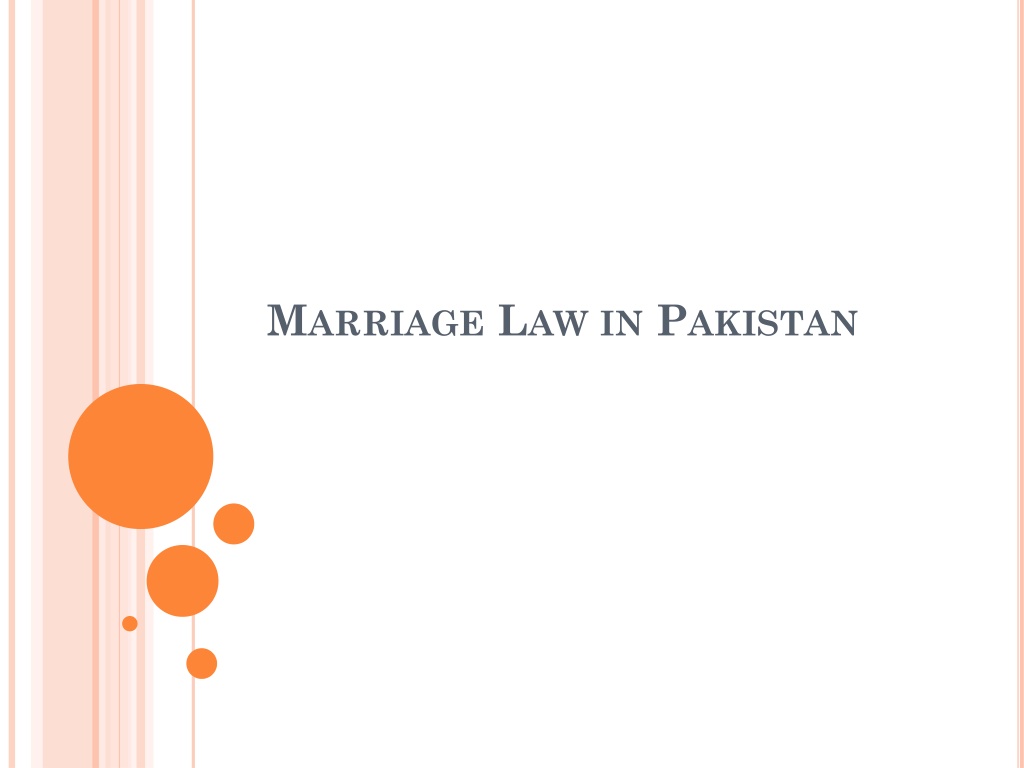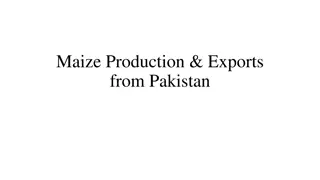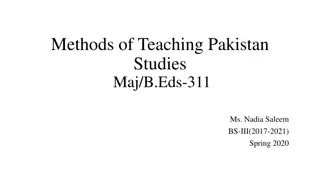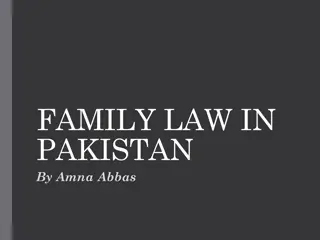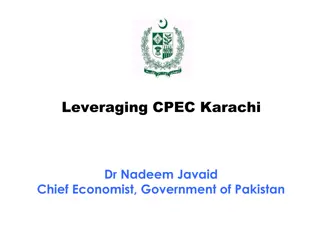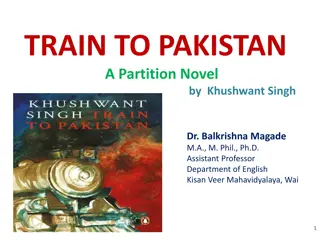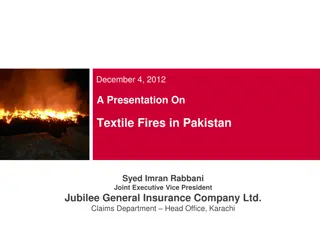Family Laws and Marriage Legalities in Pakistan
The legal system of Pakistan blends English common law and Islamic law, influencing various aspects such as commercial and personal laws. Family laws in Pakistan are a mix of codified and customary laws, with different laws applicable to different religious communities. Specific laws govern marriage, divorce, and family matters for Muslims, Christians, Hindus, Sikhs, Parsis, and citizens in general. Marriage is a legal union characterized by mutual consent and may vary in conditions based on common law or religious practices.
Download Presentation

Please find below an Image/Link to download the presentation.
The content on the website is provided AS IS for your information and personal use only. It may not be sold, licensed, or shared on other websites without obtaining consent from the author.If you encounter any issues during the download, it is possible that the publisher has removed the file from their server.
You are allowed to download the files provided on this website for personal or commercial use, subject to the condition that they are used lawfully. All files are the property of their respective owners.
The content on the website is provided AS IS for your information and personal use only. It may not be sold, licensed, or shared on other websites without obtaining consent from the author.
E N D
Presentation Transcript
The legal system of Pakistan is based on English common law and Islamic law. The former is more influential in commercial law while the later is more influential in personal status, criminal and tax law to some extent.
Family laws in Pakistan are a blend of codified law and customary law based on religious norms, also termed as Personal Law Presently about fifty one (51) family laws are enforceable in Pakistan, out of which thirty seven (37) laws are federal, while the remaining are provincial
About sixteen (16) family laws deal specifically with family matters relating to Muslims, three (3) with Christians, eleven (11)with Hindus, one (1) federal law each with Sikhs and Parsis, while about nineteen (19) are applicable across the board to all citizens of Pakistan, with a few exceptions.
Law and Application target group Dissolution of Muslim Marriages Act 1939 (Muslim) Muslim Family Laws Ordinance, 1961 (Muslim) Family Courts Act, 1964 (Muslim) The Divorce Act, 1869 (Christian) Parsi Marriage and Divorce Act, 1936 (Parsi) Dowry and Bridal Gifts (Restriction) Act 1976(All citizens of Pakistan) Guardians and Wards Act (applicable to all citizens Pakistan but the communities may follow their own personal law instead)
MARRIAGE It is the legal union of a man and a woman as husband and wife with mutual consent. Under Muslim Personal Law, marriage or Nikkah is a religious legal contract that regularizes the sexual relationship between man and woman.
Common law regards marriage as a civil contract with the following conditions: Parties are legally capable of contracting marriage Mutual consent or agreement An actual contracting in the form prescribe
REGISTRATION OF MARRIAGE Every marriage solemnized under Muslim Law shall be registered in accordance with the provisions of the Ordinance. For the purpose of registration of marriages under this Ordinance, the Union Council shall grant licenses to one or more persons, to be called Nikkah Registrars.
MUSLIM MARRIAGE The Muslim Family Laws Ordinance, 1961, deals with inter alia., the modes for the dissolution of Muslim marriage, maintenance and dower.
MEHER Meher is a mandatory payment, in the form of money or possessions paid or promised to pay by the groom, or by groom's father, to the bride at the time of marriage, that legally becomes her property. The specified dower is further sub-classified into prompt and deferred dower. The prompt dower is payable immediately at the time of marriage..
POLYGAMY Written Permission Arbitration Council Nomination of representative by existing wife and husband
MUSLIM FAMILY LAW ORDINANCE 1961 Talaq or dissolution of marriage is the ending of a marriage before the death of either spouse. By the husband at his will By mutual consent of the husband and wife(section 8) By a judicial decree at the suit of the husband or wife.
Husband pronounces Talaq (Article 7 of Muslim family law ordinance) A verbal Talaq is not recognized by law and the husband s failure to send written notice to the government office is treated as no divorce in law.
Talaq-al-mariz (Divorce by the Sick) Talaq Against a Minor or Insane Wife Talaq-e-tafviz: (Delegation of the Power of Talaq) Khul a Dissolution of Muslim Marriages Act 1939
Any ground recognized as valid for the dissolution of marriage under Muslim law are to be presented by wife for Khul a in court. There basic 10 such basic conditions mentioned in the Muslim law.
THE ISSUE OF THE PAYMENT OF CONSIDERATION IN CASE OF KHUL A without compensation with compensation.
CHRISTIAN MARRIAGE AND DIVORCE Issues concerning dissolution of marriage amongst Christians are dealt under the Divorce Act, 1869. The primary concept of dissolution of marriage in Christianity is through the death of one of the spouses. Divorce during the spouses lifetime is permitted only on very restricted grounds for both husband and wife through court intervention.
HINDU MARRIAGE There is no right of divorce and right to second marriage under Hindu religion. The prevailing Hindu personal laws in Pakistan are inadequate in contrast to the laws in India that provide these rights.
PARSI MARRIAGE In Parsi law, including the Parsi Marriage and Divorce Act, 1936, any of the spouses can have the marriage dissolved by the following three modes, though there appears a little distinction between the rights of husband and wife in this respect: Suit for nullity Suit for dissolution of marriage Suit for divorce
Thank You Thank You
